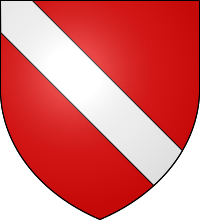Jordan Foliot facts for kids
Jordan Foliot was an important person in England who lived a long time ago, from about 1249 to 1298. He was the son of Richard Foliot, a brave knight who owned a place called Jordan Castle. His mother was Margery de Stuteville.
Jordan's father, Richard, had special rights in a town called Wellow. These rights were for something called stallage. This meant he could charge people money to set up stalls at the local market and fair. This fair happened every year on St. Swithun's Day and brought in a good amount of money.
Jordan Castle and His Lands
Jordan Foliot became a powerful Baron and the Lord of Jordan Castle. He was even given permission to make his home at Jordan Castle stronger, like a small fortress. This was a big deal because it showed he was trusted and important.
He was also the Lord of the Manor for several areas. This meant he was in charge of the land and people in places like Grimston, Wellow, and Besthorpe. He also controlled parts of Kirton, Willoughby, and Walesby. Being a Lord of the Manor gave him a lot of power and responsibility over these communities.
Becoming a Lord
In 1295, Jordan Foliot was invited to join the King's Parliament. This was a very special invitation. When someone was summoned to Parliament like this, it meant they became a Lord, or a Baron. From that point on, Jordan Foliot was known as Lord Foliot. This made his family even more important in England.
His Family and Descendants
Jordan Foliot married a woman named Margery de Newmarch. Her parents were Adam de Newmarch and Isabel de Mowbray. (You can learn more about her family by looking up the House of Mowbray).
Jordan and Margery had a son named Richard Foliot. Richard lived until about 1317. He married Joan de Braose, who was the daughter of William de Braose, 2nd Baron Braose.
Richard and Joan also had a son, who was named Richard Foliot II. Sadly, Richard Foliot II passed away in 1325. Because he didn't have any children, the title of Lord Foliot couldn't be passed down directly through his line. This meant the special title "fell into abeyance," which is a way of saying it was put on hold or became inactive.
However, Richard and Joan also had a daughter named Margery Foliott. She married Hugh de Hastings. Hugh was from another important family. His father was John Hastings, 1st Baron Hastings, and his mother was Isabel de Dispenser.
 | William L. Dawson |
 | W. E. B. Du Bois |
 | Harry Belafonte |


